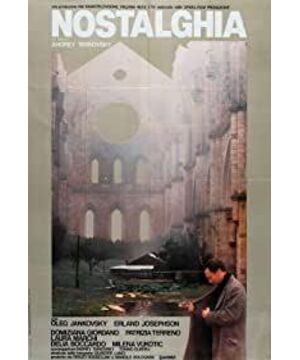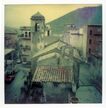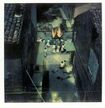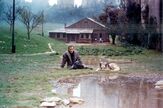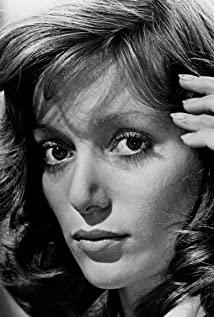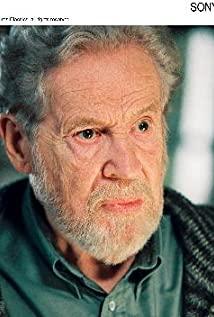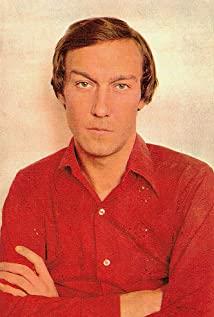"Film has only one way of thinking-poetic meaning-it can combine various irreconcilable and contradictory factors, making film an appropriate way to express thoughts and emotions."-Tarkovsky
(1) Move the lens horizontally
Andrei came to Domenico's house, stood in the corner of the wall and looked at it. The camera panned to the left following Andrei's line of sight. Andrei was pushed out from the right end of the screen, with an empty lens in the middle, and then Andrei entered from the left end of the screen. This horizontally-moving lens realizes the concealment of the characters' movements in the continuous still space, creating the illusion of time jumping.
(Two) horizontal shift + stretch lens
In this scene where Andrei leaves Domenico's home, Andrei walks out of the screen to the left after bidding farewell, and Domenico stays where he is. Then the camera moved to the left with Domenico, then Domenico stopped looking around, and the camera still moved to the left until Domenico was pushed out of the screen. At this time, the camera had reached the far left end (the space inside the house stopped extending), and we found that Andrei "disappeared". This empty shot once again created the illusion of time jumping. This time the camera did not stop there, but moved to the right. At this time Domenico was already standing in front of the camera (jumping again), facing us, as he sobbed silently, the camera stretched to his face. close up. We can feel the despair he was turned away by the people he entrusted with the "important task".
(3) The mirror image in the dream
There are many mirrors in the film, and the three protagonists all look in the mirror at different moments in reality. But the most exciting thing is this scene in Andrei's dream. In a dilapidated alley, he walked to a cabinet door with a mirror. The lens shifted from his back to the mirror surface. A hand stretched out to open the cabinet door. As the angle of the cabinet door changed, the mirror gradually appeared. The image of Domenico appears! Then the cabinet door slammed shut and Andrei reappeared. This passage is not just an illusion or an illusion, it reflects the spiritual interaction between the two and the unity of identity. The poet and the lunatic are just two expressions of "homesickness". This is also the turning point when Andrei finally recognizes himself and changes his mind to help Domenico complete his "mission." In addition, this passage reminds me of the scene where the two protagonists "fused" with each other in Bergman's "Mask", and this passage gave me no less shock than the latter.
(4) Be bright and dark
In the film of the old tower, the light seems to be mobilized by a mysterious force. From light to dark, from dark to light, the process of transformation is uniform and slow. Here are three examples.
Hotel room
Photos on the wall
Domenico's face
(5) Feathers falling from memories to reality
Feather first appeared soon after the beginning of the film, and appeared in black and white scenes. According to the logic of the movie, it belongs to the scene in memory. The second time it appeared was when Andrei burned the collection of poems, and the camera fell following a feather. At this time, Andrei had also woke up from the "dream". Regarding feathers, Tarkovsky mentioned in "Sculpture Time": This is the image he wanted to use in a short film he had prepared to shoot, but later it was used in "Homesickness". It can be said that feathers are part of "poem". As the movie said: "Poetry cannot be translated."
Concluding remarks
These magical lenses have shaped the unique image style of the old tower. But "poetic" is not just an empty aesthetic, but a part of the inner logic of the film; "poetic" is also not a tool, and should not be reduced to a certain technique or means, but should include sincere self-expression— —Old tower bluntly opposed Eisenstein’s abuse of montage: “Eisenstein didn’t want to convey the experience to the audience, he just wanted to express pure ideas. But I totally reject such films. In my opinion, Eisenstein does not want to convey the experience to the audience. His montage theory contradicts the basis for the movie to touch the audience.” In the practice of “poetic meaning”, Lao Ta regards his identity as “more like a poet” because the poet always observes with a childlike perspective. , And sincerely express your own worldview. The protagonist of "Homesickness" is precisely a poet, but also a traveler wandering in a foreign land. Although Lao Ta filmed "Sacrifice" in the days of exile (actually, "Sacrifice" was conceived much earlier than "Homesickness"), but "Sacrifice" still contains an allegorical story, and "Homesickness" It achieved a completely direct and pure expression. Therefore, I think in a sense, "Homesickness" is the real "legacy" of the old tower, and it is also the poetic ultimate.
View more about Nostalghia reviews


